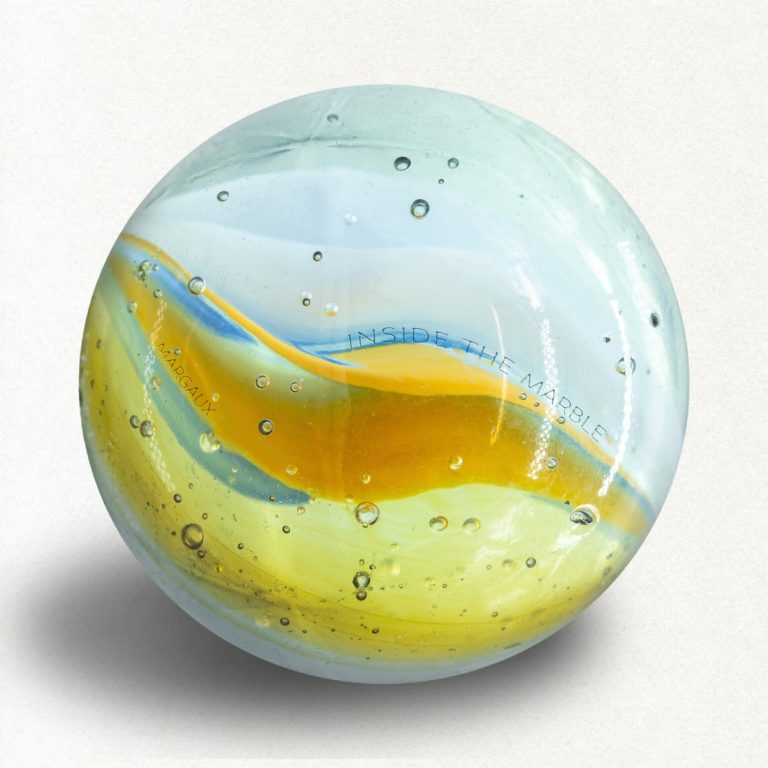Back in 2018 Margaux Bouchegnies (who performs under the name Margaux) seemed to appear out of nowhere. A short set at a DIY show in Brooklyn caught the attention of producer Sahil Ansari and PJ Sauerteig of Massif Records; the next year the label released Margaux’s debut EP, More Brilliant is the Hand that Throws the Coin. Her debut album, Inside the Marble, comes some five years later, which may seem like quite an extended period for it to arrive, but Bouchegnies’ music is not the kind that seems rushed or hurried. Her brand of indie rock echoes those she has worked with in the past, namely Katy Kirby, Dougie Poole and Allegra Krieger. It’s considered and careful, the kind of music that invites you to sit and softly contemplate it.
Full of minute detail and layers, the 10 tracks on Inside The Marble are quietly teeming with instrumentation, Bouchegnies playing the majority of them herself. She grew up playing guitar and double bass before going on to study jazz at the New School in Manhattan; here she plays guitar, electric and upright bass, mellotron, piano, glockenspiel, farfisa, and wurlitzer (among others things). Other players (including producer Sahil Ansari) contribute, but this is an album that has a keen sense of its exact details. Bouchegnies arranges with consideration for both the smallest detail and the grandest gesture.
The immediate downside is that Inside The Marble doesn’t offer a host of hooks to get immediately excited by. This is an album to give time to, to unfurl a new layer carefully with each spin. Listen to the way the violin takes on a pedal steel-like quality on “Midnight Contact” or the soft crunch of the percussion on “Picture It”. On the near-six-minute “Ships”, Bouchegnies creates a small suite of sorts, drumbeats gently tapping like waves crashing against a hull as the pillowy bellow of brass and wispy strings carry the track to a graceful end. “Make The Move” offers the album’s loudest moment, building to a flurry of plastic-sounding guitar, drum fills, and candy-coloured synths; amidst the noise there’s so many tiny details to pick apart.
Even when the volume and density rises, Bouchegnies remains level. Her tone is consistent and reasoned throughout as she contemplates the breakdown of relationships alongside existential despair. At her best she displays a wistfulness that is akin to the greats. “Dissolve/Resolve” has a timeless yearning where she ponders restless thoughts on agency. “Will I resolve / If I dissolve?”, she ponders, capturing an echo of Joni Mitchell at the edges of her voice and sweet guitar. “I Wouldn’t Want It Any Other Way” could be a highlight song from a movie where two old friends are reunited, the delicate knock of percussion and homely vocal harmonies creating a cosy knitted sweater of a song you want to wrap yourself up in.
If there’s a theme that connects all the tracks on the album together, then it’s that of change, be it acknowledging it as it happens or dealing with the fallout of it. Opening track “DNA” offers a post mortem of a relationship; “Takes two to fuck it up,” she offers, not excusing herself from blame either. “Don’t be afraid / Times always change” she sings on the following track “Picture It” while on “I Can’t Decide” she’s at a crossroads of life decisions as ticking guitars represent the passing of time. Come the final track “What Could I Say?” she’s in an inquisitive mode, frustrated by a niggling feeling (“Something’s on my mind / Circling round a question / Silent with no direction”) and wanting to understand someone more (“Show me the things that make / you who you are). This is Margaux’s music through and through, the kind that is curious and searching; music that is ready to comfort you on autumnal days; or the voice of a wise and reasonable friend giving you advice you knew was inevitable. Margaux seemed to appear from nowhere, but it’s also like you’ve known her all your life.

